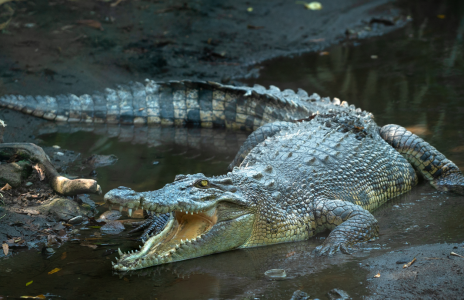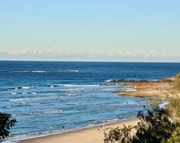Town Terrorized by Crocodile Gets Revenge – How They Served Up Justice Will Shock You!
By
Gian T
- Replies 9
In the rugged expanse of Australia's Northern Territory, where the untamed wilderness reigns supreme, the small town of Bulla found itself in the grips of a primeval fear. A massive saltwater crocodile, measuring a staggering 3.6 meters (11.8 feet), had become the stuff of local nightmares, blamed for the disappearance of beloved pets and bold enough to chase after the community's children. This ancient predator, a relic from a bygone era, had pushed the townsfolk to the edge, and they were left with no choice but to take a stand.
On a fateful Wednesday, the tension reached its climax when Northern Territory Police intervened, declaring the crocodile a 'significant risk to the community.' With careful precision, the police shot the fearsome creature, ending its reign of terror over Bulla. But the story doesn't end with the crack of a rifle; what followed is a tale of resilience and resourcefulness that is quintessentially Australian.
In a statement that resonated with the practical spirit of the outback, authorities announced that the crocodile was 'prepared for a feast in the traditional manner.' This was not just an act of retribution but a nod to sustainability and respect for the natural world, even in the face of danger. Before the feast, local children were given a crucial 'crocodile safety session,' turning a moment of relief into an educational experience. They were shown the formidable creature up close, a stark reminder of the dangers lurking in their waterways.
The crocodile's demise was not in vain, as it provided a bounty for the community. According to Sergeant Andrew McBride, the reptile was transformed into a variety of dishes: crocodile tail soup simmered to perfection, succulent barbecue, and tender meat wrapped in banana leaves and cooked underground. The feast was a testament to the town's ability to reclaim their sense of security and celebrate their survival against a prehistoric adversary.
This incident highlights a broader issue faced by Australians living in the north. Both saltwater and freshwater crocodiles are protected species, with hunting banned since 1971 when they were nearly hunted to extinction. Since then, crocodile populations have surged, particularly in the Northern Territory, which is now home to around 100,000 of these formidable creatures.
The resurgence of crocodiles in Australia is a conservation success story, but it comes with its challenges. As Kristen Hay, a government wildlife specialist, points out, 'Any body of water in The Top End may contain large and potentially dangerous crocodiles.' These apex predators can grow up to six meters (20 feet), weigh a ton, and are opportunistic feeders, making human encounters particularly risky.
Park rangers work tirelessly to mitigate these risks, relocating hundreds of saltwater crocodiles each year from populated areas. Tragically, not all encounters are non-fatal. Recent incidents in Queensland, including the loss of a 16-year-old boy and the recovery of a fisherman's remains from within a crocodile, underscore the ever-present danger.
The story of Bulla's confrontation with the crocodile is a stark reminder of the delicate balance between human settlements and wildlife in Australia. It's a narrative of respect, caution, and the indomitable human spirit that finds a way to coexist with nature's most formidable creatures.

Dear readers, we at the Seniors Discount Club salute the resilience of the Bulla community and remind everyone to stay vigilant and informed about wildlife in their areas. Have you ever had a close encounter with Australia's wildlife that you'd like to share? Or perhaps you have thoughts on the balance between conservation and community safety? Join the conversation in the comments below and let us know your views!
On a fateful Wednesday, the tension reached its climax when Northern Territory Police intervened, declaring the crocodile a 'significant risk to the community.' With careful precision, the police shot the fearsome creature, ending its reign of terror over Bulla. But the story doesn't end with the crack of a rifle; what followed is a tale of resilience and resourcefulness that is quintessentially Australian.
In a statement that resonated with the practical spirit of the outback, authorities announced that the crocodile was 'prepared for a feast in the traditional manner.' This was not just an act of retribution but a nod to sustainability and respect for the natural world, even in the face of danger. Before the feast, local children were given a crucial 'crocodile safety session,' turning a moment of relief into an educational experience. They were shown the formidable creature up close, a stark reminder of the dangers lurking in their waterways.
The crocodile's demise was not in vain, as it provided a bounty for the community. According to Sergeant Andrew McBride, the reptile was transformed into a variety of dishes: crocodile tail soup simmered to perfection, succulent barbecue, and tender meat wrapped in banana leaves and cooked underground. The feast was a testament to the town's ability to reclaim their sense of security and celebrate their survival against a prehistoric adversary.
This incident highlights a broader issue faced by Australians living in the north. Both saltwater and freshwater crocodiles are protected species, with hunting banned since 1971 when they were nearly hunted to extinction. Since then, crocodile populations have surged, particularly in the Northern Territory, which is now home to around 100,000 of these formidable creatures.
The resurgence of crocodiles in Australia is a conservation success story, but it comes with its challenges. As Kristen Hay, a government wildlife specialist, points out, 'Any body of water in The Top End may contain large and potentially dangerous crocodiles.' These apex predators can grow up to six meters (20 feet), weigh a ton, and are opportunistic feeders, making human encounters particularly risky.
Park rangers work tirelessly to mitigate these risks, relocating hundreds of saltwater crocodiles each year from populated areas. Tragically, not all encounters are non-fatal. Recent incidents in Queensland, including the loss of a 16-year-old boy and the recovery of a fisherman's remains from within a crocodile, underscore the ever-present danger.
The story of Bulla's confrontation with the crocodile is a stark reminder of the delicate balance between human settlements and wildlife in Australia. It's a narrative of respect, caution, and the indomitable human spirit that finds a way to coexist with nature's most formidable creatures.
Key Takeaways
- A large saltwater crocodile that had been menacing a community in Bulla, Northern Territory, was shot by police due to it being a significant risk.
- The crocodile had reportedly been lunging at children and adults, and had taken multiple community dogs.
- After its death, the crocodile was cooked and eaten by the local residents in a traditional feast that included crocodile tail soup and barbecue.
- Despite crocodiles being a protected species in Australia, public safety concerns necessitate the removal of dangerous crocodiles, and interactions with humans can be fatal.
Dear readers, we at the Seniors Discount Club salute the resilience of the Bulla community and remind everyone to stay vigilant and informed about wildlife in their areas. Have you ever had a close encounter with Australia's wildlife that you'd like to share? Or perhaps you have thoughts on the balance between conservation and community safety? Join the conversation in the comments below and let us know your views!








